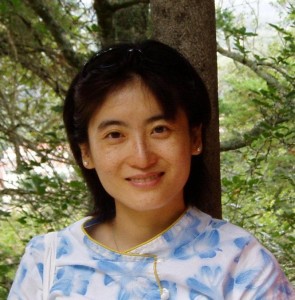Past Lectures
Yanyuan Ma, PhD
Department of Statistics at Penn State University
Dr. Yanyuan Ma’s research interests include measurement
error models, dimension reduction, mixed sample problems,
latent variable models, selection bias issues, missing not-atrandom problems, distribution shifts and semiparametrics
more generally. Dr. Ma is a fellow of the Institute of
Mathematical Statistics and the American Statistical
Association.
Date & Time: 9:30 am - 12:30 pm, Oct 16, 2024.
Location: Room 426 in building 2 at HSPH
Semiparametric Learning
The short course will cover the basics of semiparametric methods including the relation between estimators and the corresponding influence function, the construction of influence function from a geometric approach, the treatment of the nuisance components and the difference in handling a parameter in a semiparametric model and the functional of the functional components of the model itself. We will use the most simple missing response problem in some basic settings as examples to illustrate the implementation of the semiparametric methods.
Jingshu Wang, PhD
Department of Statistics at the University of Chicago
Dr. Wang's main research interest is in developing statistical methods
and machine learning tools for cutting-edge bio-technologies and
genetic problems. She currently works on various problems related to
single-cell multi-omics and Mendelian Randomization. Dr. Wang’s
research also includes developing new statistical methods and theories
for multiple p-values combinations to increase replicability and/or
power, causal inference, and factor models, with their applications in
statistical genetics.
Date & Time: 9:30 am - 12:30 pm, Sep 19, 2024.
Location: Countway Library, Ballard Room 503 (5th Floor)
Understanding Disease Causality: An Introduction to Mendelian Randomization
Understanding the pathogenic mechanism of common diseases stands as a foundational objective in clinical research. Mendelian Randomization (MR), a method gaining increasing popularity, offers an innovative approach to discerning causal relationships by utilizing genetic variants as instrumental variables. When assumptions are satisfied, MR empowers the inference of causal effects from observational data, even in the presence of unmeasured confounding. This short course contains two lectures covering the foundational concepts and assumptions of MR, recent state-of-the-art methods to deal with assumption violations, and connections between MR and related fields. We will start with an introduction of the basic idea of MR with deeper discussions on the assumptions underlying an MR study. Then, we will introduce various recent methods designed to address assumptions’ potential violations. We will also explore advanced topics such as multivariable MR, within family MR, MR with time series data, and the practical challenges of employing MR in the context of genetics and epidemiology.
Matt Wand, PhD
Distinguished Professor, University of Technology Sidney
Matt Wand is a distinguished Professor of Statistics at the University of
Technology Sidney, Australia. During 1997-2022 he was an associate
professor in the Department of Biostatistics at Harvard School of Public
Health. He has also held faculty appoitments at Rice University, Texas
A&M University, the University of New South Wales and the University of
Wollongong. Professor Wand is an elected fellow of the Australian
Academy of Science, the America Statistical Association and the Institute
of Mathematical Statistics. He has co-authored more than 130 statistics
journal articles and 10 R packages. About 40 of these papers and 3 R
packages are concerned with Variational Approximations.
Date & Time: 10 am - 12 pm, May 6 & May 9, 2024.
Location: Countway Library room # CL1-032
Variational Approximations In Statistics Part I & Part II
Variational approximations facilitate approximate inference for the parameters in complex statistical models and provide fast, deterministic alternatives to Monte Carlo methods. It is emerging as important body of methodology in an era in which data sets and models are continually becoming bigger. Much of the contemporary literature on variational approximations is in Computer Science rather than Statistics and uses terminology, notation, and examples from the former field. In this shortcourse we explain variational approximation in statistical terms. In particular, we illustrate the ideas of variational approximation using examples that are familiar to statisticians.
This short-course involves working through a series of mathematical and computing exercises. All of the computing exercises are in the R language, although expertise in R is not assumed. Familiarity with undergraduate-level distribution theory and matrices is assumed.
Zijian Guo, PhD
Department of Statistic at Rutgers University
Research Interests: High-dimensional statistics, Nonparametric Statistics, Causal Inference, Econometrics and Applications to Health and Genomics Data.
Date & Time: 11:30 am - 1:30 pm, Mar 4, 2024
Location: Countway Library room # CL1-032
Nonregular Inference
Uncertainty quantification is an essential aspect of statistics and data science. Traditional inference methods rely on establishing standard limiting distributions, such as asymptotic normality by CLT. However, the complexity of modern data science requires more advanced uncertainty quantification tools. The traditional inference tools cannot be applied to a collection of nonregular inference problems, such as boundary constraint problems, singular problems, post-selection problems, machine learning-related algorithms, nonsmooth causal functionals, and dynamic treatment regimes.
In this talk, I shall discuss two general principles of handling nonregular inference. For the first principle, I mainly focus on repro-sampling (Xie & Wang, 2022). Inspired by this sampling idea, we present how to solve two challenging inference problems encountered in multi-source learning: statistical inference for distributionally robust learning (Guo, 2023a) and statistical inference for robust federated learning (Guo et al., 2023). We illustrate these proposals with multi-institutional EHR studies.
For the second principle, I discuss how to apply it to recover a variety of existing nonregular inference tools, including repro sampling (Xie & Wang, 2022), the Anderson-Rubin test, Universal Inference (Wasserman et al., 2020), Searching and Sampling (Guo, 2023b), and HulC (Kuchibhotla et al., 2021). These recently proposed methods enable deriving accurate and reliable results in various complex data science applications.



